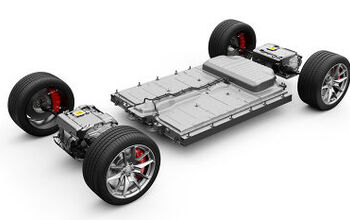General Motors Death Watch 51: Dancing With the Devil
'We didn't plan it this way. But Delphi has become a metaphor for nearly every economic and social issue gripping America.' Jesus, I hope not. Before I explain my concerns, let's review. The speaker is Robert "Call Me Steve" Miller, president of bankrupt auto parts supplier Delphi. Miller made his remarks to a bunch of industry wonks at Automotive News' grandiosely-named World Congress. Now, strip out the hyperbole (Delphi's plight isn't a metaphor for the impact of rap music on African Americans) and Miller's saying 'as goeth Delphi, so goeth American manufacturing.' Like I said, scary stuff.
Back in the fall of '05 (no pun intended), Miller was the tough-talking turnaround expert who'd taken the reins at GM's former subsidiary. Miller was all about cutting the United Auto Workers (UAW) down to size: wages, pension, health care, vacations, job classifications, the lot. Words were not minced. If the UAW didn't agree to a 60% cut to its hourly workers' wages, Miller vowed to have their Delphi contract thrown out by a federal bankruptcy judge. Analysts hailed Miller's "we can't afford this shit anymore" stance as the automobile industry's long-awaited, much-needed wakeup call. Supposedly, Miller's realism was both a preview and template for GM's survival.
It's hard to believe that the man who dared take the UAW to task for unionizing his company's lawn care would cave so quickly and completely to organized labor. But then, the stakes couldn't have been any higher. If Miller made good on his threat to deep-six Delphi's UAW contract– an accord that the parts maker's bankruptcy had conclusively revealed as untenable– the UAW would have nuked Delphi's production lines. Starved of parts, General Motors would have rolled over and died. In fact, the entire US auto industry would have been thrown into chaos, as edge-living subcontractors followed the mother ship straight into the impact crater.
How the UAW turned "Call Me Steve" Miller into The Joker is anybody's guess, but you don't have to 'fall' into a vat of toxic waste to know that a trillion dollar status quo does not go quietly into that long good night. Ultimately, The Joker's mission to deflate Delphi's union's bloated costs was waylaid by GM CEO Rick Wagoner, a man whose UAW dealings are distinctly cephalopodan. Faced with Delphi's doomsday scenario, unwilling to use a UAW strike at Delphi to put his house in order, Rabid Rick bellied-up to the bar. The ensuing multi-billion dollar damage to GM's tab will be both epic and ongoing– but nobody does epic and ongoing like GM.
GM's forthcoming bailout will defuse the possibility of a UAW confrontation at Delphi. No surprise, then, that man once considered the Dr. Death of old school American unionism is now talking about "soft landings." In other words, Delphi's GM-funded UAW agreement will maintain its union members in the style to which they've become accustomed while pledging/pretending to make future "adjustments" to the company's labor costs… Eventually. In other other words, once again, US automakers are putting off until tomorrow what can't be put off forever: a fundamental restructuring of administration, production and sales.
Thankfully, Delphi's plight is NOT symbolic of American industry's ability to compete with foreign rivals. For one thing, you'd be hard-pressed to find another multi-national conglomerate that can simply transfer its profit-killing labor costs to its largest customer (the word "blackmail" should probably be in there somewhere). For another, most US manufacturers have already solved the problem of sky-high labor costs and restrictive union practices. They've gone bust, forced their unions to face reality or transferred manufacturing operations to non-union locations (either here or abroad). What, exactly, is Delphi and GM waiting for?
The Joker, of all people, should know the drill; this is the man who personally dragged Bethlehem Steel and United Airlines kicking and screaming into the 21st century. Delphi's situation is simply more of the same: a huge, outdated company displaying a pathological inability to change. Detroit laughed at small Japanese cars in the 60's, sniggered at German luxury cars in the 70's, ridiculed hybrids in the 90's, and so on. By the time they "got it", they'd lost it. What's different about GM and Delphi's approach to their manufacturing costs, now that Delphi is an "independent" company? Nothing.
Readers of this series will not be surprised by Rabid Rick's readiness to pay the UAW the blood money needed to keep The General on life support. But few insiders had figured The Joker for a fool. Obviously, personally, he isn't. Come what may, Robert S. Miller will emerge from this slow motion debacle with considerable wealth. The same cannot be said of Delphi or GM.
More by Robert Farago
Latest Car Reviews
Read moreLatest Product Reviews
Read moreRecent Comments
- Lou_BC Sweet car.
- FreedMike With 157K miles, that's basically a beater that looks good. Plus, I heard Honda CVTs turn dicey with age. I'm a "no" at $12,500, but someone's heart will go all aflutter over the J-vin (Ohio-vin?) and pay up. With a manual in the same shape, I'd be in for a LOT less.
- EBFlex More proof the EV world is crumbling. In a market with supposedly “insatiable demand”, these kinds of things don’t happen. Nor do layoffs.
- Buickman 17 Lacrosse, 18 Enclave, 19 Stingray Drop.each Red, Tan guts.I just want to feel this moment, and I own it~ (them, sic)
- FreedMike Dodge always had the best colors on the Challenger. I particularly liked Hemi Orange and Plum Crazy. Otherwise, give me Mazda's Soul Red.


































Comments
Join the conversation